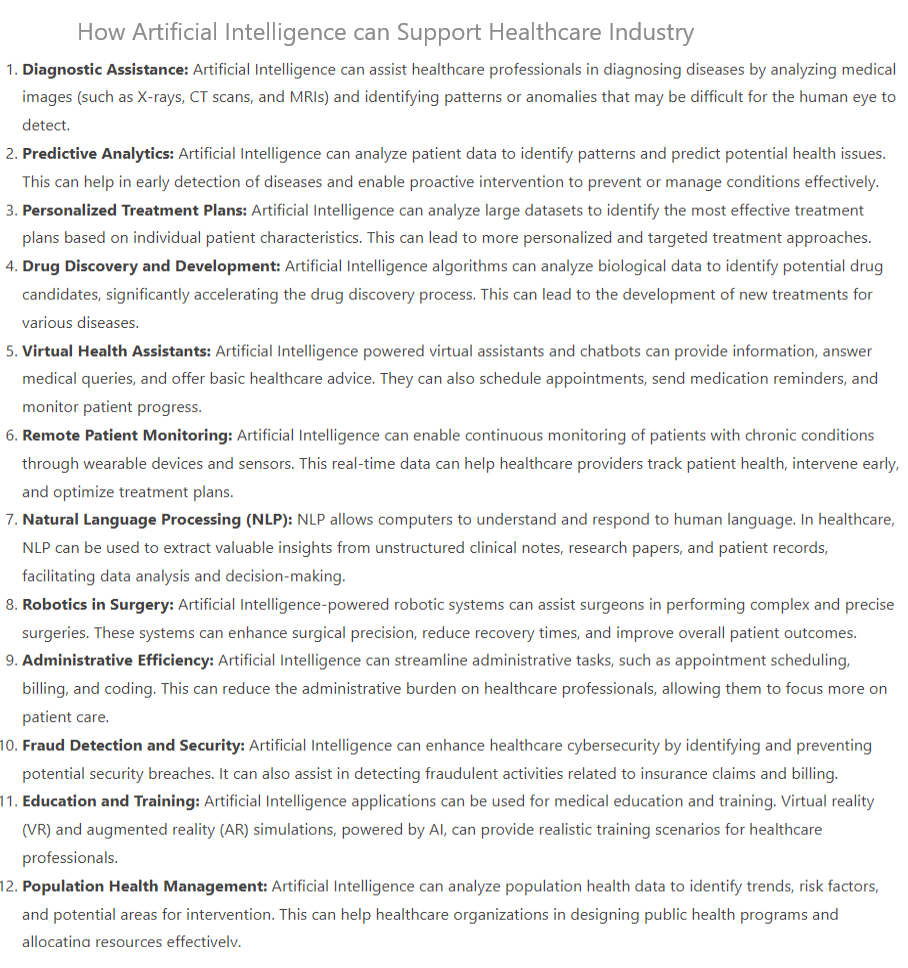
Artificial Intelligence (AI) has the potential to revolutionize healthcare in various ways, improving efficiency, accuracy, and patient outcomes.
The following below ways Artificial Intelligence can Support Healthcare Industry
- Diagnostic Assistance: Artificial Intelligence can assist healthcare professionals in diagnosing diseases by analyzing medical images (such as X-rays, CT scans, and MRIs) and identifying patterns or anomalies that may be difficult for the human eye to detect.
- Predictive Analytics: Artificial Intelligence can analyze patient data to identify patterns and predict potential health issues. This can help in early detection of diseases and enable proactive intervention to prevent or manage conditions effectively.
- Personalized Treatment Plans: Artificial Intelligence can analyze large datasets to identify the most effective treatment plans based on individual patient characteristics. This can lead to more personalized and targeted treatment approaches.
- Drug Discovery and Development: Artificial Intelligence algorithms can analyze biological data to identify potential drug candidates, significantly accelerating the drug discovery process. This can lead to the development of new treatments for various diseases.
- Virtual Health Assistants: Artificial Intelligence powered virtual assistants and chatbots can provide information, answer medical queries, and offer basic healthcare advice. They can also schedule appointments, send medication reminders, and monitor patient progress.
- Remote Patient Monitoring: Artificial Intelligence can enable continuous monitoring of patients with chronic conditions through wearable devices and sensors. This real-time data can help healthcare providers track patient health, intervene early, and optimize treatment plans.
- Natural Language Processing (NLP): NLP allows computers to understand and respond to human language. In healthcare, NLP can be used to extract valuable insights from unstructured clinical notes, research papers, and patient records, facilitating data analysis and decision-making.
- Robotics in Surgery: Artificial Intelligence-powered robotic systems can assist surgeons in performing complex and precise surgeries. These systems can enhance surgical precision, reduce recovery times, and improve overall patient outcomes.
- Administrative Efficiency: Artificial Intelligence can streamline administrative tasks, such as appointment scheduling, billing, and coding. This can reduce the administrative burden on healthcare professionals, allowing them to focus more on patient care.
- Fraud Detection and Security: Artificial Intelligence can enhance healthcare cybersecurity by identifying and preventing potential security breaches. It can also assist in detecting fraudulent activities related to insurance claims and billing.
- Education and Training: Artificial Intelligence applications can be used for medical education and training. Virtual reality (VR) and augmented reality (AR) simulations, powered by AI, can provide realistic training scenarios for healthcare professionals.
- Population Health Management: Artificial Intelligence can analyze population health data to identify trends, risk factors, and potential areas for intervention. This can help healthcare organizations in designing public health programs and allocating resources effectively.
